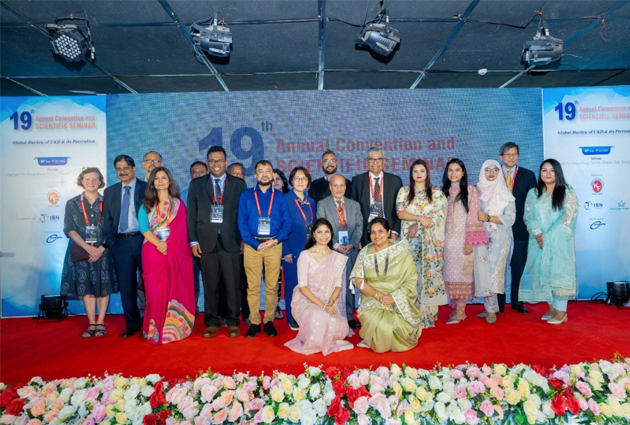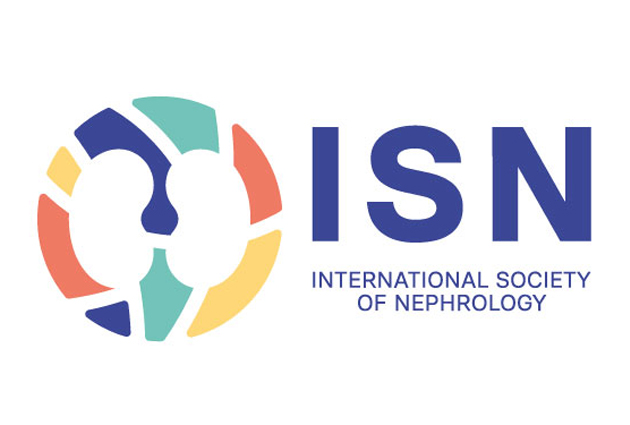“Through This Program, the Kidney Foundation Has Become the Largest Hospital in Bangladesh for Kidney and Urological Diseases and Dialysis and Transplantation,” – Find Out More About the 2024 Schrier Award Winner
Participating members of the SRC Bangladesh-UK pair at the 19th annual convention
The Schrier Award recognizes remarkable achievements from graduated Sister Renal (SRC) and Sister Transplant Centers (STC) pairs. The winner of the 2024 Schrier Award is the SRC Bangladesh-UK pair:
Emerging Center: Kidney Foundation Hospital and Research Institute, Dhaka, Bangladesh
Supporting Center: Royal London Hospital, London, UK
Attend the Schrier Award session at WCN’24 from 11 a.m. – 12 noon on Monday, April 15 (during plenary session 3). Professor Mohammad Shakib Uz Zaman Arefin will present the acceptance speech. Dr. Tasnuva Kashem will present at the spotlight session, “Global Impacts on Kidney Care and Transplantation via Sister Centers Partnerships,” from 1-1.45 p.m. the same day.
Register for the congress here
The Kidney Foundation Hospital and Research Institute (KFH) in Dhaka, Bangladesh, is a non-profit institution established in 2003 by founder and President Professor Harun Ur Rashid with a modest initial capital of just $1000 and six dialysis machines on loan. In 2017, the KFH joined the ISN Sister Renal Centres Program in partnership with the Royal London Hospital (RLH).
The Kidney Foundation Team
According to Professor Arefin and Dr. Kashem, KFH SRC liaison officers, the partnership has been instrumental in developing kidney care in the region. They state, “Through the support of this program, the Kidney Foundation has become the largest hospital in Bangladesh for kidney and urological diseases and dialysis and transplantation.”
Expanding services: Becoming a national center of reference
People with few or no resources receive treatment free of charge in this hospital, which has now doubled in capacity to 300 hospital beds, including 110 dialysis unit beds, eight post-operative recovery room beds for urology patients, eight intensive care beds, and four high dependency unit beds for transplant patients. The Foundation has established a state-of-the-art diagnostic laboratory and operates an outpatient facility serving 250-300 patients daily. The hospital now has four modern operating theaters equipped to handle various interventions and surgeries.
Over 573 patients benefit from continuous ambulatory peritoneal dialysis (CAPD), while another 700-800 patients receive regular hospital hemodialysis from 96 dialysis machines. In addition, the hospital now runs a thriving transplant program, which has performed 585 transplants. The center initiated deceased donor kidney transplants in January 2023.
Dr. Kashem helped establish a renal high-dependency unit (HDU) with support from the RLH. Nurses and anesthetic consultants trained at the KFH became part of the team. The KFH team conducted training workshops to educate doctors and nurses from other hospitals on basic and advanced life support for renal patients. The HDU gradually transitioned to an intensive care unit and the KFH is now an internationally recognized center for research projects, workshops, and training programs catering to medical professionals nationwide.
The KFH has expanded to include three additional branches running successfully in other districts. These branches offer daily outpatient services, minor surgeries such as arteriovenous fistula, laboratory investigations, and hemodialysis for kidney failure patients.
Investing in education: Training healthcare professionals to improve local patient care
The center implemented training programs for renal nurses, pharmacists, and dieticians, including a one-year nursing diploma course, which has been in place for the past four years. Nurses who graduated from this program have found placements in hospitals within Bangladesh and internationally. Some doctors at the KFH are involved in international Ph.D. projects, and Dr. Kashem is engaged in a Ph.D. project in collaboration with Queen Mary University London. Full scholarships support these doctors as part of the ISN SRC Program.

ISN Educational Ambassadors Dr. Stanley Fan (UK) and Dr. Klara Paudel (Nepal) in Dhaka, Bangladesh, in November 2022
With support from the ISN Educational Ambassadors and Continuing Medical Education Programs, local faculty were trained in peritoneal dialysis and CAPD. The Foundation shared these skills with other institutions in Dhaka and further afield. In addition, doctors from the London team led training sessions at the KFH on transplant biopsy, tunneled hemodialysis catheter insertion, bio-impedance, and histopathology.
Doctors at the KFH also traveled to the UK through the SRC program to receive training in critical care nephrology, imaging, and clinical research at the RLH. Regular teaching on complex biopsy cases furthered the academic and clinical development of the kidney care team in Dhaka. Dr. Kashem commented, “Our histopathology service is now regarded as the best in the country, processing 90 biopsy samples per month from across the nation.”

In the front row, Professor Narayan Prasad (far left), Professor Harun Ur Rashid (middle right) and Professor Magdi Yakoob (far right), alongside other participants at the 19th annual convention and scientific seminar
The KFH partners with the RLH for an annual convention and scientific seminar, an event the Bangladeshi kidney care community eagerly awaits. At least 550 participants registered for the event in 2023.
Professor Arefin was recently awarded Fellow of the International Society status. Dr. Farnaz Nobi from the KFH will train at Barts, Royal London Hospital as an ISN-AMGEN Schrier Fellow from July 2024 under mentors Professor Magdi Yakoob and Dr. Stanley Fan. Seven abstracts were accepted for poster presentation at WCN’24, and three WCN24 travel grants were awarded to doctors from the KFH to attend.
Professor Arefin and Dr. Kashem comment, “We had unprecedented support from the Royal London Hospital in this successful partnership and achieved our objectives. The SRC program has enabled us to initiate affordable critical care and emergency services in the private sector, saving many lives.”
The KFH is set to offer support to other centers in South Asia, using the extensive training and experience gained through its SRC partnership with the RLH.













